How much do you really know about the Bill of Rights? Well the Bill of Rights are the first 10 amendments to the United States Constitution. These amendments guarantee civil rights and liberties to every individual: the freedom of speech, right to bear arms, rule of due process of law and many more. For example, The Eighth Amendment states: “Excessive bail shall not be required, nor excessive fines imposed, nor cruel and unusual punishment inflicted.” This Amendment stopped the government from imposing any harsh penalties before or after a defendant was convicted of a crime.
When the United States Constitution was first ratified it did not include the Bill of Rights, so it did not contain the Cruel and Unusual Punishment Clause. Without the clause, the Constitution gave the government power to punish those who committed federal crimes. Some of the acts that the government showed cruel and unusual punishment was through the crucifixion, burning at the stake, electric chair and quartering. An opponent of the Constitution, Abraham Holmes, stated: “They are nowhere restrained from inventing the most cruel and unheard-of punishments, and annexing them to crimes; and there is no constitutional check on them, but that racks and gibbets may be amongst the most mild instruments of their discipline.” Many people also believed that without this amendment it meant that Congress can use punishment as a tool of oppression. With the consideration of all of the objections, the Constitution had added the prohibition of cruel and unusual punishments.
Save your time!
We can take care of your essay
- Proper editing and formatting
- Free revision, title page, and bibliography
- Flexible prices and money-back guarantee
In regards to excessive fines, a fine is given to an arrested person who has committed a less serious crime. Paying the fine will give an end to the matter and the accused will not need to appear in court again. The Supreme Court has said that excessive fines are those that do not follow due process of law and reach an amount where the person loses their property. The Excessive Fines Clause has given the government limitations on taking payments as a punishment for the defendant's offense. This amendment protects Americans not just against the federal government but against state and local governments too.
The Eighth Amendment also prohibits excessive bail. A bail is a fine given to an arrested person either by the police or by the court when committing a serious crime. The criminal is put into custody until the bail has been paid. When bail is paid the matter is not finished but the accused will not have to remain in custody for the rest of the trial. The Supreme Court stated that bail needs to be determined by two things: how much money an accuser has and how likely a person is to disappear before trial. If someone has committed a serious crime there may not even be a bail given and they will be held until they are no longer seen as a threat.
The Eighth Amendments origin is the British Magna Carta of 1215. The Magna Carta states the idea that punishments had to fit the severity of the crime. This document was also the first English document that placed restrictions on violating certain rights given to people. In 1689, the amendment was put into the English Bill of Rights by the Parliament because of the Titus Oates case. The Titus Oates case was based on when he Titus Oates lied in court and caused many innocent lives to be taken. His punishment included the pillory, which is where the person's head and hands are secure in wooden frames and he also got whipped while being tied to a moving car. Later on, this case was reviewed and was seen as having intense cruel and excessive punishments. This amendment was later added to The United States Constitution as the Bill of Right in 1791 and was voted for by 9 out of 12 of the states. The case was the main reason why this amendment was added to the Bill of Rights.
The only thing that I would change about the eighth amendment would be the existence of the death penalty. If the amendment was proposed to stop all sources of cruel and unusual punishment then why was the death penalty not included? I do believe there are people who deserve intense types of treatment but I do not believe the death penalty should be the primary method. If the criminal conducts a very serious crime they should spend life in prison but their should be certain restrictions and guidelines given for those who do certain crimes.






 Stuck on your essay?
Stuck on your essay?

